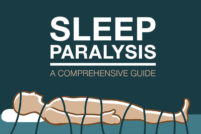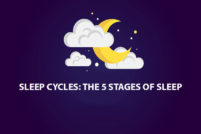The demands of life often come at the expense of our sleep. But what happens to those hours we miss out on? Do they just disappear, or is your body silently keeping track of your debt in the background?
Science has shown that sleep is like a bank account: Every night you don’t get enough sleep you’re going into overdraft. Eventually, you have to repay your debt or get slammed with hefty fees — which in this case come at the cost of your health!
Find out how to calculate your sleep debt, and — more importantly — how to start paying it back and balance your checkbook.
What Is Sleep Debt?
Sleep debt is the difference between the amount of sleep you need, and the amount you’re actually getting. Every night you skim off some time from your recommended sleep — whether it be an hour or just 15 minutes — your sleep debt is mounting. [1]
Many of us mistakenly believe that we’ve trained ourselves to be “short-sleepers,” that we’re accustomed to receiving less than the recommended amount of sleep and function fine without it.
Unfortunately, this is simply untrue: the amount of sleep you need is largely determined by your genes, and therefore cannot be artificially altered — no matter how hard you try. [2]
Sleep deprivation is tricky — especially over the long term: the more tired you get, the less tired you actually feel. You’re so used to suffering the effects of your sleep debt that you no longer appreciate how debilitating they actually are!
Here are some numbers to put it all into perspective: [3]
- Getting just 2-3 hours too few of sleep every night for a week has same effect as pulling an all-nighter.
- Staying up 24-hours and driving is equivalent to having blood alcohol level over legal driving limit.
In the age of alarm clocks, early morning meetings, and working late into the evening in the glare of artificial lighting the majority of us have accumulated some amount of sleep debt.
Signs And Symptoms Of Sleep Debt
We’ve already pointed out that the longer you’re in a state of sleep debt, the harder it becomes to recognise the symptoms.
As fuzzy-headedness, fatigue and irritability become the norm, you can barely remember what it feels like to be truly well-rested. [2]
However, despite our lack of awareness, this debt is having a significant impact on our overall health and well-being. As your sleep bank account dips into overdraft, you put yourself at increased risk for developing chronic medical conditions.
Short Term
- Foggy brain
- Vision issues
- Impaired driving
- Forgetfulness
- Slowed reaction time
- Inflammation
Long Term
- Obesity
- Insulin resistance
- Diabetes
- Heart disease
- Stroke
- Memory loss
- Depression
How To Calculate Your Sleep Debt
While you may not feel you’re missing out on that much sleep, you might be surprised by what your sleep debt actually is.
Using the National Sleep Association’s recommended amount of sleep you can calculate your sleep debt by taking the difference between the prescribed amount and how much actual sleep you are getting each night.
You’ll notice that the recommendation is given as a range: For adults, 7-9 hours.
You may be someone who only requires 7 hours of sleep per night to be fully rested — and therefore experience slightly less sleep debt than those of us who require a full 9 hours.
Since it’s difficult to know if we are 7-hour sleepers, or 9-hour sleepers, you can do a quick calculation using the range’s average of 8 hours.
|
Monday |
Tuesday |
Wednesday |
Thursday |
Friday |
Total |
|
|---|---|---|---|---|---|---|
|
Hours Needed |
8 |
8 |
8 |
8 |
8 |
40 |
|
Hours of Sleep |
6 |
7 |
5 |
8 |
7 |
33 |
|
Sleep Debt |
2 |
1 |
3 |
0 |
1 |
7 |
In this example, this person has accumulated a total of 7 hours of sleep debt throughout the week. They’d now have to get an additional almost entire night of sleep in order to make that up!
Unfortunately, there are only 7 days in a week, and if this is similar to your weekly routine you’re almost certainly not going to be able to pay back all your debt.
Sleep-Wake Ratio
Calculating your sleep debt is a little more complicated than subtracting these two numbers. Research has shown that we need 30-minutes of sleep for every hour we spend awake. [4]
In order to factor in your hours spent awake in your sleep debt calculation, you’ll need to find your sleep-wake ratio.
If you spend 16 hours awake during the day, than 16 x 30 minutes = 8 hours. The trick comes when you’ve been up for more than 16 hours.
For example: Let’s say you wake up at 7 am to get ready for work, and only head to bed at 1 am the following morning. That’s 18 hours you’ve spent awake!
If you then sleep 6 hours, you take the difference (8-6) and conclude that your sleep debt in 2 hours.
Wrong. Those extra hours of being awake mean that you now owe 3 hours of sleep!
The ideal sleep-wake ratio is 1:2. Since in our example the ratio is 1:3, this person will actually have to sleep 9 hours that night in order to not accrue any sleep debt.
|
Hours of Sleep |
Hours Spent Awake |
Sleep Ratio |
|---|---|---|
|
8 |
16 |
1:2 |
|
6 |
18 |
1:3 |
Can I Make Up For Sleep Debt?
There is good news: You can repay your sleep debt!
However, it’s not quite as simple as just sleeping 16 hours a night on the weekends.
Research indicates that sleep debt is most effectively paid back at a slow, steady pace, rather than in large bursts.
Particularly due to the impact of these extended sleeping periods on your circadian rhythms.
How to go about making those payments depends on whether your debt is on a short-term loan or a long-term one.
Repaying A Short-Term Debt
If a particularly busy week spent finishing up a work project, or dealing with social responsibilities has left you with a 10 hour sleep debt you can pay this back with a weekend of self-care.
Add 3-4 hours of sleep per night on the weekend, and head to bed an hour early every day the following week until your debt is repaid. [1]
Repaying A Long-Term Debt
Long term debts can be trickier to overcome than short-term ones: your loan has now accrued a hefty amount of interest and making minimum payments just won’t cut it.
Therefore, if months of chronic sleep deprivation have resulted in a particularly hefty sleep deficit, you’re going to need to be a bit more creative in order to get your sleep back on track.
You should consider taking a vacation on which you plan to do little but catch up on your sleep. Turn off your alarms and simply allow your body to sleep its desired amount each night. [2]
At first, you may find yourself sleeping 10+ hours per night as your body makes up for the lost time. However, as your sleep debt is repaid you’ll find yourself sleeping more normal hours again.
Tip: This is also a great way to figure out where in that 7-9 hour recommended range your natural required amount of sleep is.
It’s much easier to make up for a short-term debt than a long term one, so it’s in your best interest to start repaying it now! But be aware – sleeping too much has it’s own health risks so it is important to find the right balance.
How To Avoid Sleep Debt
Once you’ve balanced your accounts, you’ll want to tackle the issue at its core by learning how to avoid sleep debt in the first place.
While playing catch-up can help you pay back some of your sleep debt, and mitigate its impact on your health, it’s by no means the best way to avoid the negative effects of chronic sleep deprivation.
Adopting healthy sleep hygiene practices can help improve the quality of your sleep, and have you falling asleep faster so that you can easily tack on more hours each night.
To learn more about how sleep hygiene can revolutionize your sleep read our in-depth article here.
Finally, a scientific reason to sleep in on a Saturday!





